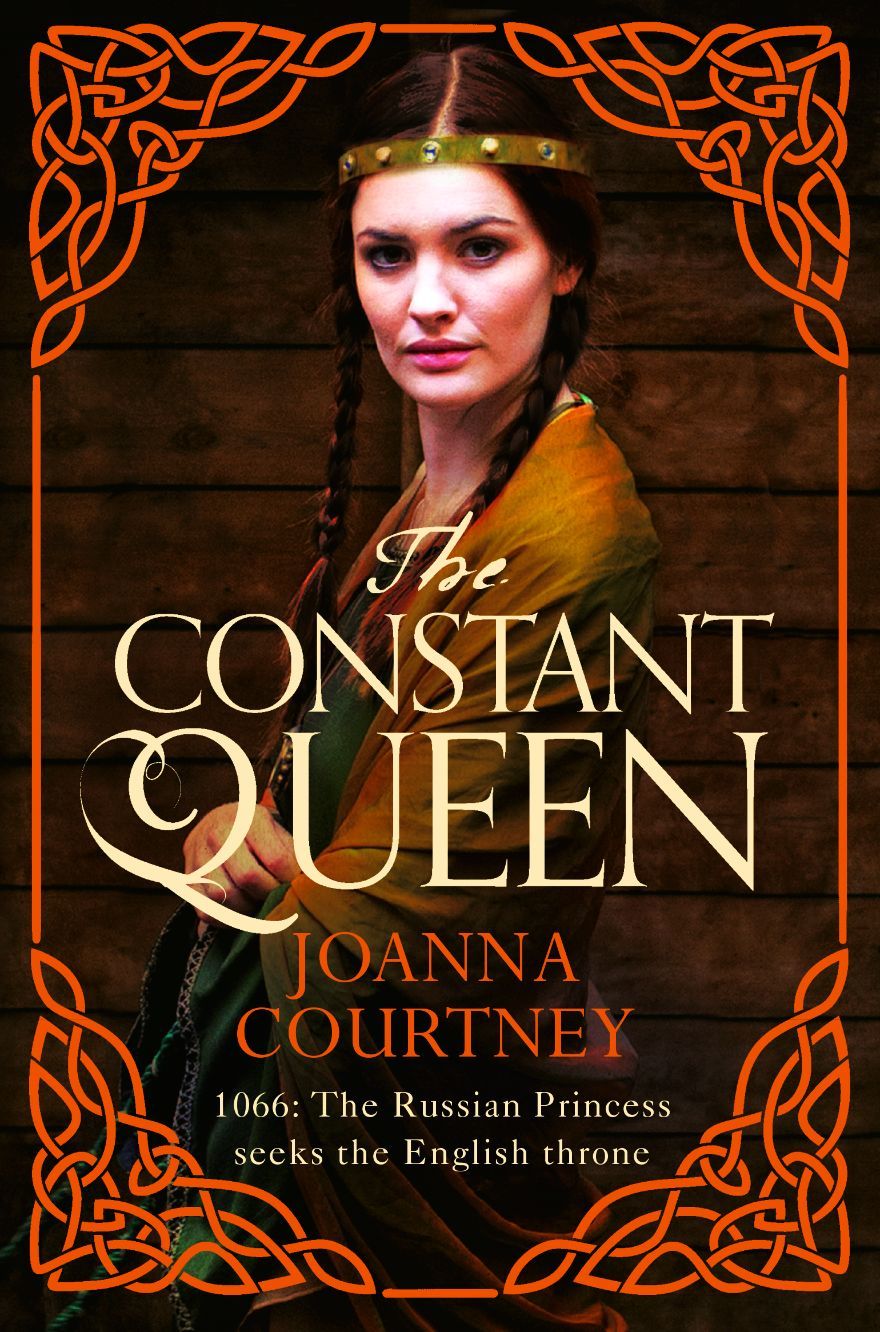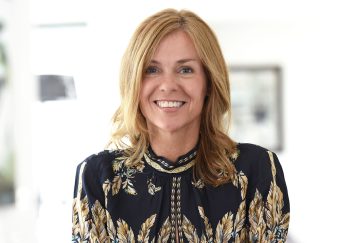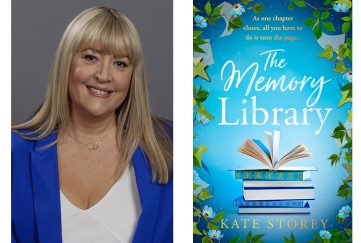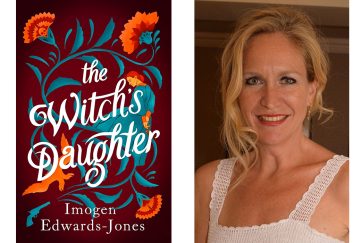Q & A with Joanna Courtney, Author of The Constant Queen
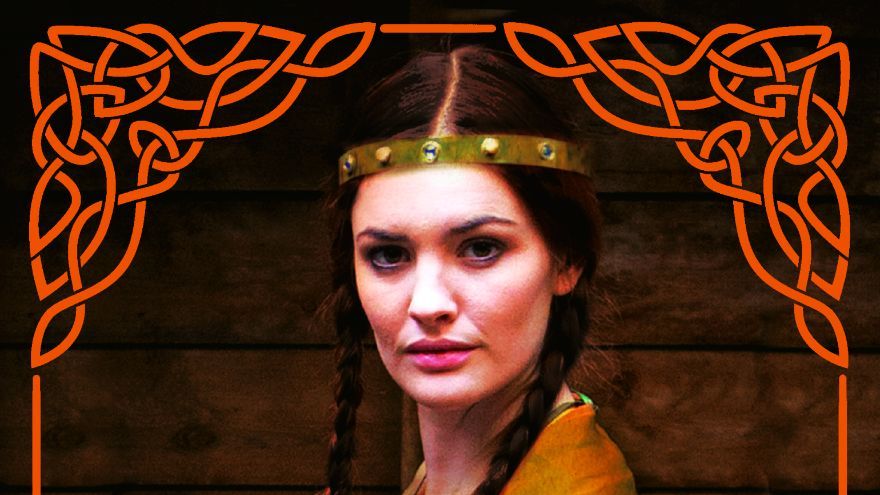
The Constant Queen
by Joanna Courtney
Pan PB £7.99
Interview by Karen Byrom
“Saxons Are The New Tudors”
Joanna Courtney is the author of an exciting trilogy of novels exploring the lives of three wives of 1066’s key players – Harold Godwinson, Harald Hadrada and William the Conqueror.
The first in the series, The Chosen Queen, introduced us to Aedyth, wifr of Harold Godwinson, who lost his life at the Battle of Hastings.
Now The Constant Queen introduces us to Elizaveta of Kiev, wife of Harald Hadrada, the fierce Viking Warrior whose campaigns in the north of England weakened Harold Godwinson’s army and left him vulnerable to William the Conqueror’s forces.
This fascinating period of English history is enriched by Joanna’s vivid storytelling as she re-imagines the life of Elizaveta, a feisty young princess who is more than a match for her doughty husband. Theirs is a love story, passionate and strong, as together they take on the might of their enemies in their quest to seize the English crown.
Well known to My Weekly readers as Joanna Barnden, Joanna is a natural storyteller, skilled at portraying characters and settings in vivid detail.
We’ve caught up with her to ask all about her writing.
You delighted My Weekly readers with short stories for years. Was novel writing a natural progression, or had you always planned to go down that route?
I’ve wanted to write novels from when I was really small. Indeed, when I was about ten I churned out several Enid Blyton style boarding school adventures which are now sadly lost. As I grew older I realised that I needed to hone my craft and writing short stories was a wonderful way to do that. It also fitted into my life at the time as I was bringing up two small children so only had the odd hour here or there to write.
I love writing short stories because you can explore so many different ideas and characters without being tied down to one for a whole year, as you are with a novel. All along, though, I was writing novels too and eventually I hit on the right genre in historical fiction and was signed up by Pan Macmillan for The Chosen Queen.
What made you choose the historical novel genre?
I’ve always loved history. Alongside English, it was my favourite subject at school and I’m constantly drawn to the shadows of the past in our lives and landscapes – ask my children who groan very loudly whenever I spot a castle on the horizon! I remember going to Holyrood Palace in Edinburgh when I was quite young and being hugely struck by the blood stain on the floor (presumably re-touched and hopefully not with real blood!) where David Rizzio was murdered by Lord Darnley. I was overwhelmed by the fact that I was standing on the very same boards, in the very same room where that had actually happened. From then on the past has always been something that is still with us for me. Historical fiction is the best way to bring it back to life. I love the process of re-imagining historical figures for readers.
There are plenty Tudor novels about but we don’t get many stories around the events of 1066. What is it about this particular period that first interested you?
I discovered this period when I was researching a local history book for a friend and started looking into Edyth Godwinson, wife of King Edward “the Confessor” who was listed as owning the land in the Domesday book. I found her life fascinating. When I looked further into her family I discovered an amazing cast of characters, including her brother Harold who famously died at Hastings .
The more I looked into the Saxons – and then the Vikings and Normans – the more I was gripped. The idea of the “dark ages” is a terrible myth; they are only dark because we don’t have as much information about them as about later times. If you look into the law codes and the monetary policies and the stunning jewellery of pre-1066 England, you will find that they were in many ways as sophisticated as their flashier Tudor descendants.
I felt a real sense of loss that we knew so little about them, particularly about the women, and I set about trying to redress that a little. I love the Tudor period as much as anyone but earlier courts had all their intrigue and glamour and excitement and I’d encourage people to read about them. Saxons are the new Tudors!
Elizaveta of Kiev, the Constant Queen, wife of Harald Hardrada, is a wonderful character, feisty, loyal and passionate. Was it difficult to create a woman we can all identify with while keeping her true to her place in time and history?
That is absolutely one of the biggest challenges of writing historical fiction. Before The Chosen Queen I wrote a novel about Edyth Godwinson who had an amazing and very difficult life. But my agent didn’t manage to find a publisher for that book because editors wanted a “feistier heroine”. I understand that people want to read about women they can identify with. Someone who just sits around embroidering and waiting for men to sort her life out for her is not very engaging to the modern woman. On the other hand, creating a rampant feminist would be anachronistic. It’s a matter of finding the right balance. For me that comes down to really understanding your character.
There is no way, whatever period she grew up in, that Elizaveta – and others like her – would have sat quietly in the background. I firmly believe that women have not changed that much in the last 1000 years (a drop in the evolutionary ocean). Whilst their circumstances may have altered, their essential desire to achieve and to help shape the lives of those around them has not.
The Constant Queen starts with rebellious Elizaveta disguising herself as boy to ‘ride the rapids’ in a river race in Kiev and that pretty much demonstrates that she is not going to be a woman who sticks to conventional boundaries. I hope that throughout the novel she stays true to that core self whilst also being believably of her time in terms of the way she can act. I don’t write sword-wielding women (though I’d quite like to – maybe one day). But I do believe that the wives of great men would have been big influencers behind the scenes.
Edyth of Mercia, wife of Harold Godwinson from your first novel, The Chosen Queen, and Elizaveta are both fascinating, but very different women – do you sneakily admire one over the other.
I would say that Edyth is quite like me in that she’s impetuous and determined but also quite dutiful. Elizaveta is more mercurial and has a real temper. That’s not something that is really a fault of mine (though I have plenty of others) so it was really fun to write someone who can flare up and shout at her poor husband. Although it gets her into all sorts of hot water, I admire that in Elizaveta and would sneakily like to be more that way myself. Though it would help to also be beautiful enough to get away with it!
You say “it is possible to be in love with your husband and your current hero” – but would Harold, Harald or William win your favour?
Tricky one. They’re really different characters and I like certain aspects of all of them. I tend to think of Harold of Wessex as the boy-next-door, handsome in an accessible way and very approachable. Harald Hardrada is out-and-out sexy and William is more of a cute geek – earnest and serious but hugely loyal. Clearly these ideas are something of a nonsense as they were all ruthless, powerful warrior rulers. But I like to think more about the men off the battlefield as the personal side drives my stories, so it works for me.
I worried how I was going to get on with writing about William as he’d been the “baddie” in both my first books and is fairly universally known as such in English history. But the more I looked into his and Mathilda’s lives the more I could see the good in him.
He became duke at just seven and spent much of his childhood avoiding murder and rebellion. He was bravely and openly good to his low-born mother and her family and was a man known for his loyalty and close-knit circle of comrades and family.
Both Harolds, it’s worth noting, had two wives whereas William was famous for his love and fidelity to Mathilda so that has to count for something. I’m lucky, I suppose, that I have all three of them in my head – a different “book-boyfriend” for every mood!
How long does it take you to research your books? Did you travel to Kiev and Norway? And Wales?
Each book takes about a year to produce of which around half of that time is research. I do a large bulk of research before I start writing but at some point I have to make myself stop delving into the myriad fascinating alleyways I could pursue and start writing my story.
I leave all sorts of gaps of things to find out though (for example what their bedroom might look like, what they’re wearing or eating) so there’s another set of more targeted research once the first draft is complete. I love researching but there is always more to discover and at some point you have to admit that you will never know it all and focus on bringing the characters to life with what you do have.
I’ve travelled a little for research. It’s relatively easy in the UK but trips further afield are hard to fit in. Earlier this year I went on a whirlwind tour of Normandy which was excellent but I have children so my time is very restricted.
It’s also tricky as the Saxons and Vikings in particular built mainly in wood so very little of their buildings are left to see. Medieval Kiev for example was a stunning place – a huge walled city on the top of a vast hill – but clearly it is lost in the mass of the urban sprawl of today’s city. Going there would offer little to help me in terms of either facts or imagination so I have had to rely on near-contemporary accounts instead.
I would love to go to Norway and am sure that much of its landscape is as it was in Elizaveta’s time. Plus they have a number of wonderful reconstructions of Viking houses and even ships that I’d so like to see. Elizaveta and Harald lived very sweeping lives and The Constant Queen travels with her from Kiev and Constantinople up to Norway, Iceland and the Orkneys. One day I will follow in her footsteps myself but it may have to wait a year or two.
Having read The Constant Queen – and I can promise readers it’s a treat in store – any hints on the final story in the trilogy, due out next year. I believe it’s to be about William the Conqueror’s wife, Mathilda?
That’s right. The final novel, The Conqueror’s Queen, follows Mathilda of Flanders, Princess of a highly sophisticated court at Bruges, as she travels very reluctantly to marry William “the Bastard” of upstart little Normandy. This novel explores the other side of the 1066 story and I felt it was hugely important to really understand the conquest from the Norman point of view.
What it really comes down to is that in 1051, just a few months after they were married, William and Mathilda (we don’t have actual evidence that she was there but, equally, we don’t have any that she was not!) were invited to Westminster and apparently promised the throne by King Edward. At the time the Godwinson family were in exile but the following year they fought their way back to England. They then spent years trying to ensure a Saxon followed Edward onto the throne. They suppressed the 1051 promise on our side of the “narrow sea” but in William and Mathilda’s minds it was a strong and vital commitment and one they were determined to bring to fruition.
The interesting bit for Mathilda is that in her teens she was apparently in love with an Englishman called Brihtric Mau, to the extent that she seems to have attempted to propose to him. Needless to say her father was having none of it and soon matched her up with William instead. She was bitterly opposed to this at first but they grew into a strong and hugely united couple and the novel explores how that comes about.
I’ve read that you love Arthurian literature. Can we look forward to an Avalon trilogy at any point?
I have always been fascinated by the gloriously romantic stories of Arthurian literature and specialised in them in the third year of my English degree so, yes, I would love to explore them in my own writing one day. That said, however, there are thousands of writers already doing that so I’m not sure yet what I could add. Watch this space…
You’re an admirer of our own Queen, describing her as dignified. Can you imagine her as the subject of one of your novels, if you were looking back on her life hundreds of years from now?
Ooh yes, absolutely. She’s certainly been through some drama and, indeed, seismic change for the monarchy and I would love the chance to explore the fascinating relationship between her and Philip in fiction. One of the things I love about historical fiction is the way we can trace patterns in events once they are done and the queen’s life will certainly embrace a vital social period and would give it a wonderful focus. It probably will need a hundred years to see that clearly, though, and I fear I don’t have that long!
What are the highlights of being a successful author?
The sheer joy of seeing your book on shelves is a big one. I still remember walking into Waterstones in Derby where we were launching The Chosen Queen last year and seeing my book on a big display with Phillipa Gregory and Elizabeth Chadwick and all my historical writing heroes – it was such a rush.
I also really love it when readers contact me to say how much they enjoyed the book and, perhaps, to say that I’ve sparked an interest in the Saxon period. That’s hugely rewarding.
What do you think now of the first thing you ever had published?
The first thing I had published was a short story in The People’s Friend. I have it on file and I still quite like it. What I’d really like to see is those boarding-school books I wrote as a child but that’s not to be. Though I do have the first novel I wrote as an adult and it’s a pretty torturous affair. I was fresh out of university and it was a self-consciously literary piece about the devil – very Miltonic and Dante-esque and, frankly, dull. It’s still an idea I quite like mind you, so maybe one day…
And finally … can My Weekly readers look forward to reading another short story from you in the magazine, some time when you have time to draw breath?
As I said, I do love writing short stories, so absolutely – there will be more on the way very soon.
@joannacourtney1
More like this:
Santa Montefiore
Ann Cleeves
Susan Lewis

